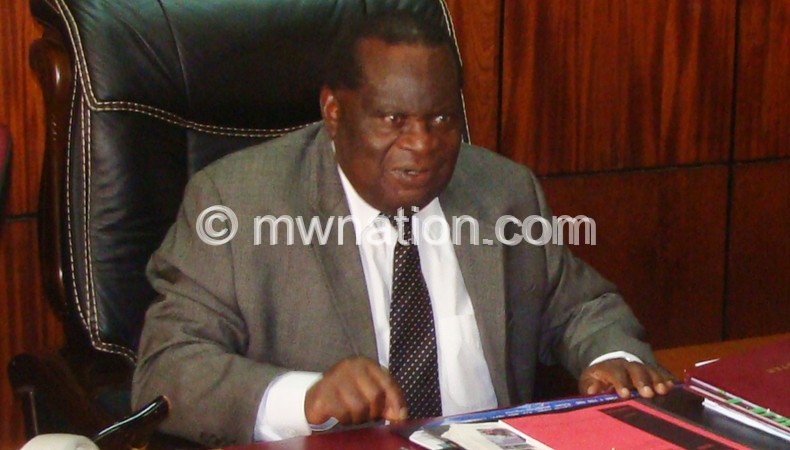Goodall pledges economic stability
Newly-appointed Finance Minister Goodall Gondwe has described the state of the economy as ‘depressed’ saying there is little economic activity taking place.
But Gondwe, now doubling also as the Economic Planning Minister, has vowed to bring about the much-needed macroeconomic stability by lowering down both interest and inflation rates as well as maintain enough foreign exchange reserves during his term of office, among others.

“It’s a depressed economy and economic activity is not high. Investment is not taking place at an acceptable rate,” said Gondwe in an exclusive interview at his office at Capital Hill on Friday evening.
Gondwe said he was confident to bring Malawi’s inflation rate back to single-digit lane “and there is no doubt about that but the only question is when.”
Currently, headline inflation rate stands at 23.9 percent, a rate the Finance Minister described as too high.
Business News understands that the economy last registered a single digit year-on-year headline inflation rate of 9.8 percent in December 2011 before throwing itself back to a double digit rate of 10.3 percent in January 2012.
Gondwe said it was pleasing to note that the price of a 50 kilogramme bag of maize has declined from a peak of K10 000 to around K3 000.
Maize is attached more weight of 50.2 percent in the Consumer Price Index (CPI), a basket employed to compute inflation figures, such that its availability on the market determines the national average price.
With regards to managing foreign exchange reserves, Gondwe said there are two key critical issues to consider, namely, to earn more reserves and manage such reserves well.
“We think in that respect, we can attain foreign reserves in two parts and firstly is the short term and secondly in the long term. Firstly, concerted efforts are needed on producing diversified crops that can be exported such as legumes and in the long term we need to pursue minerals vigorously,” said the Finance Minister.
Economists globally also agree that macroeconomic stability should entail low and stable inflation rate, low long term interest rates, low national debt relative to a country’s Gross Domestic Product (GDP), low fiscal deficit-the gap between government expenditure and tax revenue minus borrowing and grants-as well as currency stability.
Last week, the International Monetary Fund (IMF) advised the newly-elected Peter Mutharika’s government to ensure fiscal plans based on realistic estimates and avoid accumulation of arrears or excessive amounts of domestic debt if Malawi is to achieve macroeconomic stability. (Sadc) and Comesa—which stood at nine percent in 2013 compared to 10.2 percent in 2012, according to the report.
The March HCPI, however, indicates that Comesa registered relatively high annual average inflation rate of 9.7 percent in 2013 compared to 12.1 percent in 2012.
On the other hand, the Sadc region registered relatively lower annual average rates of seven percent in 2013 and 7.4 percent in 2012.
According to the data, annual average inflation rate decreased in both regions and was relatively high in the Comesa region compared to the Sadc region during the period.





